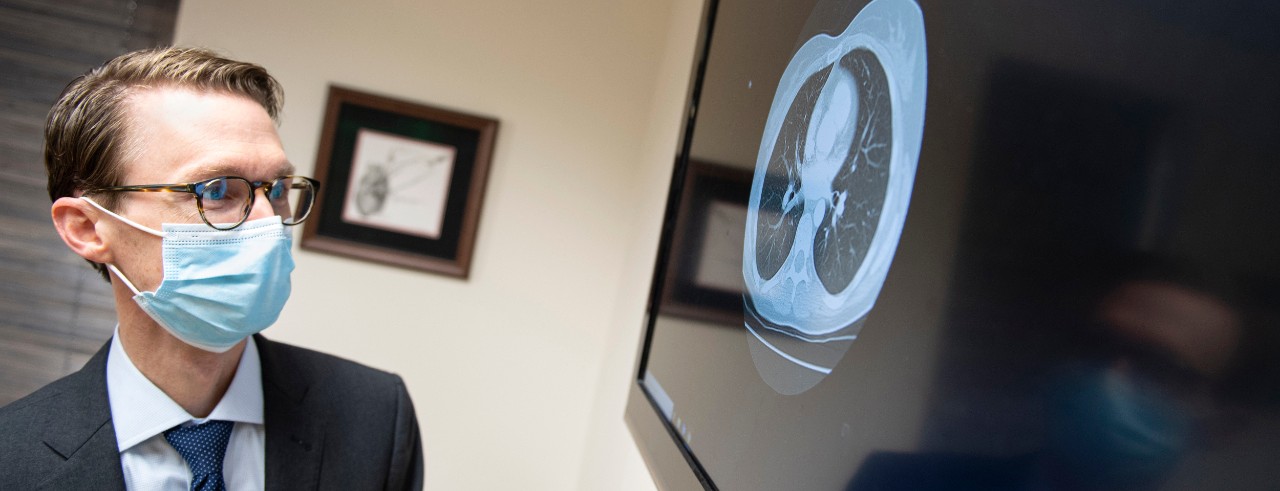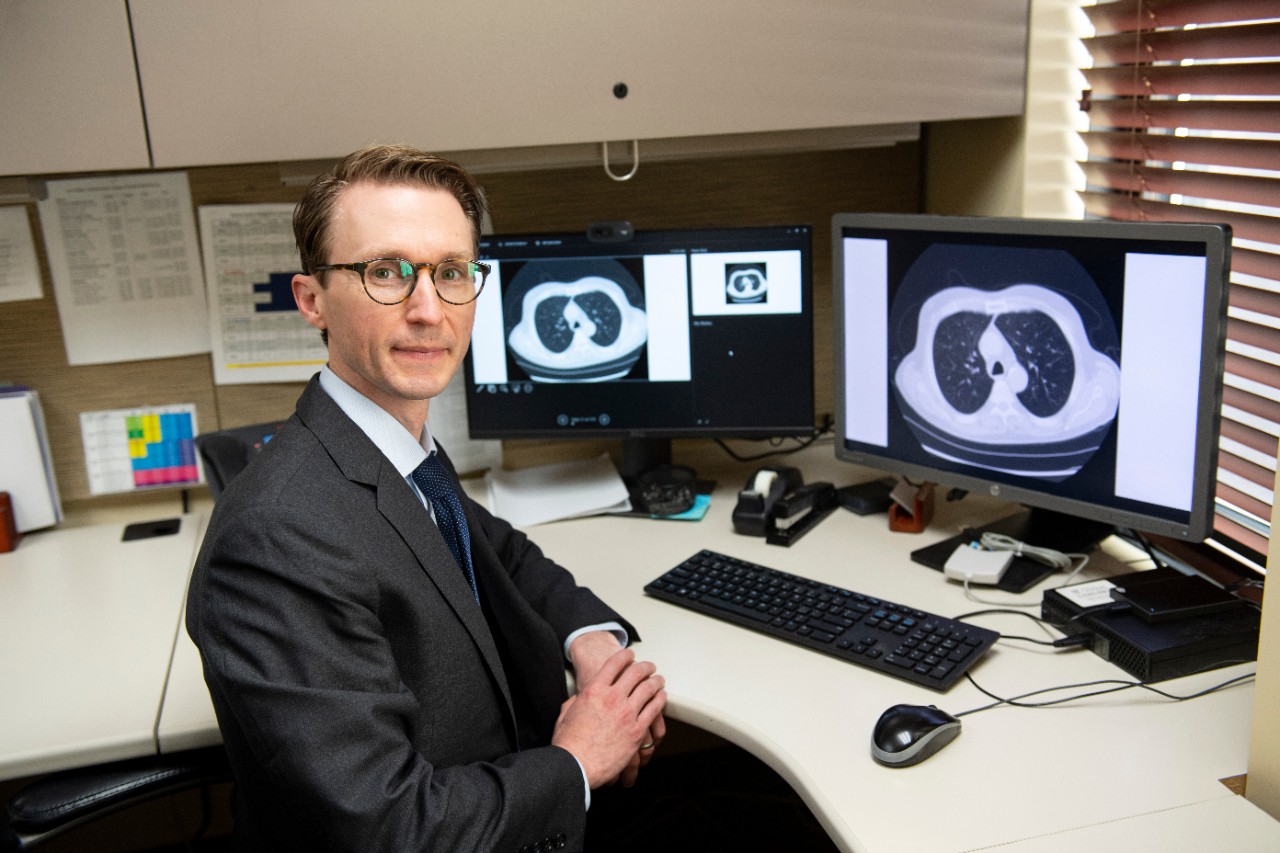
A new approach to close the gap in lung cancer care
UC study shows patients could undergo surgery, even if still smoking
Lung cancer is the most deadly cancer in the United States, but its impact is not evenly felt across racial and ethnic groups.
African American, Hispanic, American Indian and multiracial patients experience higher rates of lung cancer and worse overall survival rates and are less likely to undergo surgery compared to white patients, according to Robert Van Haren, MD.
Many of the factors behind these disparities need ongoing work and will not be fixed overnight, but Van Haren and his colleagues at the University of Cincinnati have identified one practical change that can be made immediately. In a new study published in The Journal of Thoracic and Cardiovascular Surgery, researchers found offering surgery to current smokers could lead to more equitable care.
Van Haren said smoking is the largest risk factor of lung cancer, with about 40% of thoracic surgeons requiring patients to stop smoking before offering them lung cancer surgery.
“In principle it’s a reasonable idea so they can do better and not have complications afterwards, but, for the patients who either can’t quit or won’t quit, it kind of blocks them an opportunity to have a curative surgery and the best treatment option,” said Van Haren, assistant professor of surgery in the Division of Thoracic Surgery in UC’s College of Medicine, a UC Health thoracic surgeon and University of Cincinnati Cancer Center member.

Robert Van Haren, MD, said new research suggests surgeons should offer lung cancer surgery to patients who currently smoke. Photo courtesy of Unsplash.
The past prevailing wisdom said patients who don’t quit smoking and have lung cancer surgery have worse outcomes, but Van Haren and his colleagues questioned if that was still the case.
The study examined a sample of 601 patients who had undergone lung cancer surgery from January 2006 to December 2020 to compare outcomes between current and former smokers. Van Haren noted the study consciously excluded any patients who had never smoked.
“When we’re in a clinic seeing a patient, if they smoke, we can never get them back to a ‘never-smoker’ and we can’t change what’s happened in the past,” Van Haren said. “But the question is can we still do operations safely on those patients who are smoking, and we found that we could.”
When patients were matched based on similarities in lung function and other medical data, Van Haren said the risk of complications and/or death following surgery was the same between current and former smokers. Stopping smoking can still help improve the health of patients, but Van Haren said it should no longer be a barrier preventing a patient from receiving lung cancer surgery.
Van Haren said offering surgery to current smokers could help close ethnic and racial disparities, as minority patients are more likely to continue smoking following a lung cancer diagnosis.

Offering lung cancer surgery to current smokers could help close racial and ethnic disparities among patients, Van Haren said. Photo/Colleen Kelley/University of Cincinnati
“We think that with this study we can potentially safely offer surgery to more patients and try to improve the outcomes for lung cancer for minority and lower-income patients who otherwise might not be offered surgery because of the perceived risk,” Van Haren said.
While this change could immediately improve patient outcomes, Van Haren said UC continues to work to address other factors leading to racial and ethnic health disparities such as structural racism and socioeconomic differences. This includes more detailed interviewing after a patient is diagnosed with cancer to understand patients’ perspectives and barriers to care.
“Are there issues with financial stability or is it transportation? Is the communication between myself as the doctor and the patient effective? Do we effectively explain things to them? We want to try and improve that level of communication between all our patients,” he said.
The importance of screening
Van Haren said another tool to close racial and ethnic disparities in lung cancer is continued and improved screening. He noted new guidelines have opened screening to more people, particularly minorities who tend to get lung cancer earlier in life and smoke a bit less.
“So with screening this newer population, we’re hoping that we’re going to identify earlier cancers in those minority populations,” he said. “Early detection is one of the main things to improve outcomes. So if we can find lung cancer early, they can have a good outcome, and that’s really why screening works.”
Updated recommendations state individuals between 50 to 80 years old who haven’t quit smoking within the last 15 years and have at least a 20 “pack year” history should be screened for lung cancer.
A pack year is calculated by multiplying the number of packs of cigarettes smoked per day by the number of years they have smoked, with one pack year equivalent to smoking one pack of cigarettes per day for one year or two packs per day for six months. A 20 pack year history would mean smoking one pack a day for 20 years.
Featured photo at top of Dr. Van Haren. Photo/Colleen Kelley/University of Cincinnati
Impact Lives Here
The University of Cincinnati is leading public urban universities into a new era of innovation and impact. Our faculty, staff and students are saving lives, changing outcomes and bending the future in our city's direction. Next Lives Here.
Related Stories
CCM welcomes new violin faculty member Kenneth Renshaw
May 12, 2025
UC College-Conservatory of Music Dean Pete Jutras has announced the appointment of Kenneth Renshaw as CCM's new Assistant Professor of Violin. His faculty appointment officially begins on Aug. 15, 2025. Born and raised in San Francisco, Renshaw came to international attention in 2012 after winning First Prize at the Yehudi Menuhin International Violin Competition in Beijing. He was also a prize winner in the Queen Elisabeth International Violin Competition of Belgium, and First Prize recipient of the inaugural Manhattan International Concert Artists Competition.
The latest efforts in cervical cancer prevention
May 12, 2025
Medical Laboratory Observer interviewed the University of Cincinnati Cancer Center's Leeya Pinder to discuss the current state and future of cervical cancer prevention.
Study links adverse childhood experiences to higher risk of...
May 12, 2025
Children who have been exposed to adverse childhood experiences face an increased risk of homelessness during their childhood, according to a new study from a researcher in the University of Cincinnati’s School of Social Work.
